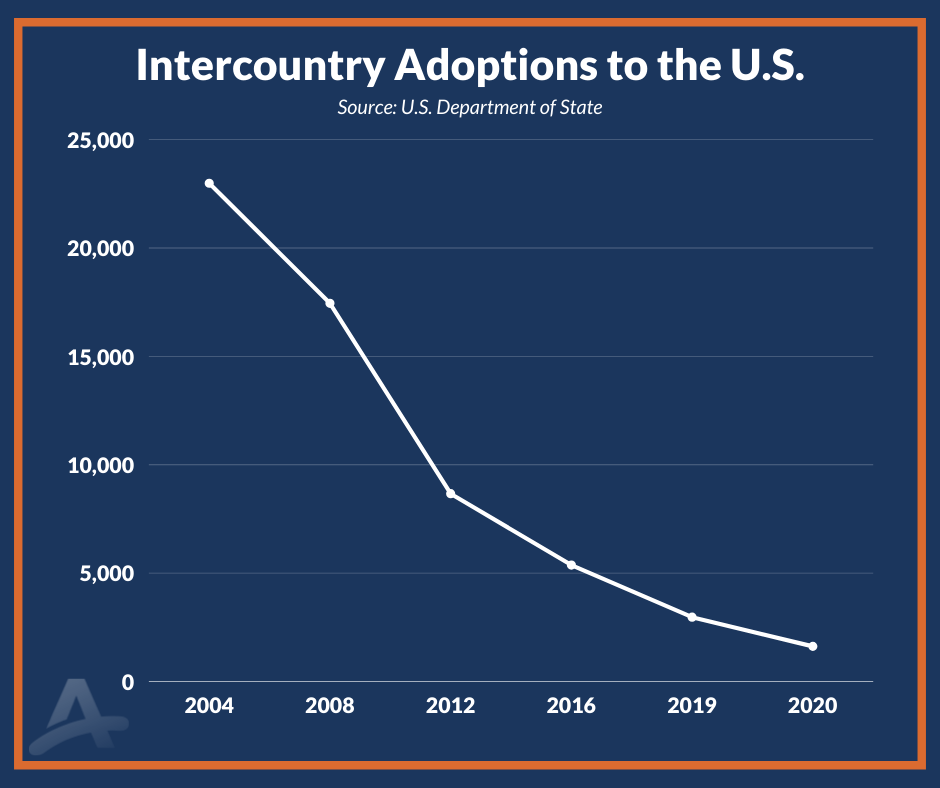NCFA Responds to Department of State Annual Report on Intercountry Adoptions
Earlier this week the Department of State released its annual report on U.S. intercountry adoptions, providing statistics for October 1, 2019 to September 30, 2020 and outlining adoption-related activities which the Office of Children’s Issues and Bureau of Consular Affairs completed during that time. Though not unexpected, it is deeply troubling to read that there were just 1,622 intercountry adoptions to the U.S. in this time period, representing another year of significant decline.
The prevailing narrative of this year’s report is the impact and challenges of the Covid-19 pandemic on the Department’s staff and operations, as well as adoptive families and adoptees.
Certainly, the pandemic and related travel restrictions significantly impeded the completion of intercountry adoptions starting in February 2020 and continuing for several months thereafter. However, the Department’s assertion that “the majority of the decline can be attributed to the pandemic,” warrants further examination, as does the larger narrative of the report which paints broad brushstrokes of departmental activity but offers relatively few measurable outcomes or specific areas of progress towards changing the current trajectory of intercountry adoptions.
Travel restrictions associated with the Covid-19 pandemic limited adoption travel, but only for a portion of the reporting year. It is misleading to suggest that absent the pandemic, intercountry adoption would not have continued its steep decline when in fact the number of intercountry adoptions has been in decline for over fifteen years with no sign of stabilizing or reversing.
The Department again points to increasing domestic adoptions in sending countries as a driving factor. NCFA advocates for and celebrates whenever domestic adoption is possible, but for the countries continually overwhelmed with thousands of children in institutionalized care, children frequently abandoned on the streets, and countless others living in temporary care with no chance at a domestic placement, that explanation rings hollow.

We can, and should, champion both domestic and intercountry adoption to ensure that there are options for all children, everywhere, to have a permanent, prepared, loving, and supported family as soon as possible. This means ensuring that government leaders with power and influence are utilizing every tool at their disposal to remove barriers and open pathways to intercountry adoption for every willing and qualified family and eligible child.
Prior to the pandemic, adoption agencies were closing in record numbers under heavy regulatory burdens ushered in by the Department’s designated accrediting entity and the Department’s decision to engage in their own unlawful rulemaking.[1] By circumventing the rulemaking process and issuing a ban on “soft referrals” under the guise of a FAQ Bulletin, the Department’s actions eroded trust, caused confusion, and frustration throughout the adoption community including with foreign adoption authorities, and impeded the prospect of adoption for a significant number of waiting children.
For far too long, and well before the pandemic, prospective adoptive parents have been faced with ever-increasing costs and process complexities that leave even the most motivated parent overwhelmed. The pandemic was not the problem, it just exacerbated ongoing systemic problems. Problems that are leaving thousands of children behind worldwide. Countless families have been left in limbo waiting for timely and appropriate adjudication of their cases, sometimes going months or years without a decision from the Department of State and USCIS on their paperwork to bring home a child they have already been matched with, or in some cases have already adopted. As a result, other prospective parents are reluctant to enter the process, agencies are hesitant to take on cases or open programs in countries where families are getting "stuck," and the likelihood of waiting children to receive a loving, permanent family goes down again.
For some time now, NCFA has petitioned both the Department of State and its counterparts at USCIS to follow the Intercountry Adoption Act’s requirement to implement a process for habitual residents to complete intercountry adoptions to the United States. More than 20 years have gone by since the IAA was passed into law and there is still no process in place for habitual residents to complete an intercountry adoption of a non-relative. NCFA receives and adoption professionals report numerous inquiries every year from habitual residents whose desire to adopt is being stymied by the government’s failure to follow the IAA in this regard.
We must come to a shared understanding of what constitutes success and strength in intercountry adoption. While the report touts the Department’s efforts at managing the challenges of the pandemic, it falls short of measurable outcomes that point to success in addressing the crisis in intercountry adoption. We call on Congress to pass S. 117 requiring the Department to establish an Intercountry Adoption Advisory Committee to consult with them on recommendations for improving intercountry adoption. This committee should include members of the private sector whose years of professional experience working with government officials, child welfare authorities, and all members of birth and adoptive families, provides invaluable expertise which can guide the formation of strategies and policies to strengthen and increase intercountry adoptions.
NCFA recognizes the effort to repair the fractured relationship between adoption stakeholders and the Department. Communication is more frequent and transparent, and reflects a less adversarial posture than in recent years. We hope that the Department’s words will now translate to significant and timely action to reverse the current trajectory. Without massive course correction, it will be the legacy we leave to future generations of children around the world who are without the permanent, loving family they deserve.
[1] https://www.cadc.uscourts.gov/internet/opinions.nsf/CE3994D0598E21B48525870D0050CBEC/$file/20-5158-1905654.pdf


